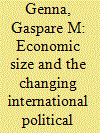| Srl | Item |
| 1 |
ID:
099892


|
|
|
|
|
| Publication |
2010.
|
| Summary/Abstract |
Why are some free trade agreements (FTAs) in the western hemisphere successfully negotiated and implemented while others seem to stagnate during negotiations? FTAs are more likely to develop when there is an asymmetrical power relationship and potential partners are satisfied with projected trade patterns. The European Union (EU) and United States have been successful in negotiating agreements with the Caribbean and Central American (CCA) countries. However, current bilateral and multilateral trade talks between the EU, the Common Market of the South (MERCOSUR), and United States are at a standstill. Although all four sets of trade negotiations include dissatisfactory conditions for the Latin American countries, the two negotiations with the CCA countries were successful completed, but the two involving MERCOSUR countries have not. These results are partially due to two factors: the economic size differential between the CCA countries and MERCOSUR vis-à-vis the EU and United States, and MERCOSUR's growing economic ties with China. MERCOSUR's medium-size economy and ties with China allows it to forgo FTAs with the EU and United States until more favorable conditions are met. However the CCA countries' immensely smaller size and economic ties with China do not allow for such abstention.
|
|
|
|
|
|
|
|
|
|
|
|
|
|
|
|
| 2 |
ID:
156832


|
|
|
|
|
| Summary/Abstract |
The violence and insecurity that Mexico suffered during former President Calderon’s war on the Mexican drug cartels have come at a grave economic cost to many cities. The criminal violence had an impact on interdependent borderlands, which are geographic areas that have a symbiotic link between cities and communities of adjoining territories. Mexican business people and consumers that live in cities along the shared border with the United States have the ability to shift their economic transactions away from their insecure environments and to US border communities. In addition, US residents that would normally travel south for economic transactions would decide to avoid violent areas and therefore conduct business on the northern side. This research demonstrates that increased violence in Mexico produced a positive economic effect on the US side of the Mexico–Texas interdependent borderlands. Specifically, our time series analysis (2002–2014) shows that increased homicides, kidnappings and extortions in adjacent Mexican cities are strongly associated with higher gross total sales in the Texas communities while controlling for economic and demographic factors. We also found that the increases in the three crime categories were not associated with the arts, entertainment and recreation sector, nor the accommodation and food services sector performance. However, there was a positive relationship with the retail sales sector.
|
|
|
|
|
|
|
|
|
|
|
|
|
|
|
|